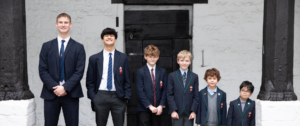On Tuesday 3 December, two RGS students showcased their historical expertise by competing in the Historical Association’s prestigious Great Debate. Cameron Brown and Saul de Gruchy each delivered compelling five-minute talks addressing the thought-provoking question: ‘How can your local history tell a global story?’ Their presentations highlighted the powerful connections between local narratives and broader global contexts.
Saul captivated the audience with a deeply personal account of his family’s experiences during the Nazi occupation of Jersey. Drawing on his great uncle’s vivid memories, Saul shed light on the challenges faced in Jersey and linked these experiences to the wider history of occupied Europe during World War II. His presentation effectively illustrated how individual and community histories intersect with global conflicts and their far-reaching consequences.
Cameron took a different yet equally engaging approach, focusing on the history of Chilworth’s gunpowder mills. Through his research, Cameron demonstrated how this local site played a significant role in the rise and fall of British imperialism. He explored the crucial impact of industry and warfare on the expansion of the British Empire, offering insightful commentary on how Chilworth’s story ties into the broader narrative of global power dynamics.
Both students handled the judges’ challenging questions with confidence, showcasing their depth of knowledge and ability to think critically under pressure. In a highly competitive field, Cameron’s outstanding presentation earned him first place, securing his progression to the semi-finals of the competition.
This extra-curricular achievement reflects not only the students’ hard work and dedication but also the strength of historical research at the RGS. The Great Debate provided a platform for young historians to explore how local stories resonate on a global scale, inspiring meaningful connections between past and present.

